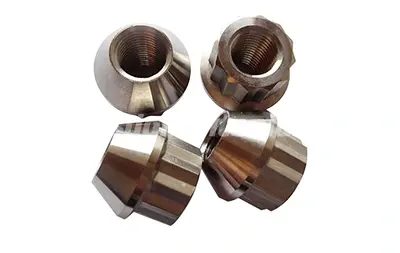
Racing wheel nuts are indeed of utmost importance in the realm of motorsports. They serve as the vital link that securely fastens wheels to the vehicle, and any failure in these components can have disastrous consequences. The design and material composition of racing wheel nuts are therefore crucial factors that directly impact safety and performance on the racetrack. This article takes a deep dive into the materials employed in racing wheel nuts, with a particular emphasis on titanium alloys. We will explore their unique properties, such as high strength-to-weight ratio, excellent corrosion resistance, and durability. We will also discuss their various applications in motorsports and highlight some of the leading manufacturers who specialize in producing high-quality Titanium Racing Wheel Nuts. By understanding the materials and their characteristics, racers, and enthusiasts can make informed decisions when it comes to choosing the right wheel nuts for their vehicles.
Material Titanium: Gr5 Ti6Al4V
The most common material used for high-performance racing wheel nuts is titanium Grade 5, also known as Ti-6Al-4V. This alpha-beta titanium alloy consists of 6% aluminum, 4% vanadium, and balance titanium. Ti-6Al-4V is prized in motorsports for its exceptional strength-to-weight ratio, corrosion resistance, and ability to withstand high temperatures.
Titanium Gr5 offers an ideal balance of mechanical properties for Titanium Racing Wheel Nuts. Its lightweight nature helps reduce overall vehicle weight, which is crucial for improving acceleration, handling, and fuel efficiency. At the same time, its high strength ensures the wheel nuts can withstand the extreme forces experienced during high-speed racing, including rapid acceleration, hard braking, and intense cornering.
The use of Ti-6Al-4V in racing wheel nuts also provides excellent fatigue resistance, which is essential for components that undergo repeated stress cycles. This characteristic helps prevent failure due to metal fatigue, enhancing the overall safety and reliability of the wheel assembly.
Tensile Strength
One of the key attributes that make Ti-6Al-4V ideal for racing wheel nuts is its impressive tensile strength. The alloy typically exhibits a tensile strength ranging from 900 to 1050 MPa (130,000 to 152,000 psi). This high strength allows racing wheel nuts to securely hold wheels in place even under extreme racing conditions.
To put this in perspective, the tensile strength of Ti-6Al-4V is significantly higher than that of many steels and aluminum alloys commonly used in automotive applications. This superior strength enables manufacturers to design smaller, lighter wheel nuts without compromising on safety or performance.
The high tensile strength of Ti-6Al-4V also contributes to its excellent fatigue resistance. Racing wheel nuts made from this alloy can withstand repeated loading and unloading cycles without developing cracks or failing prematurely. This property is crucial in motorsports, where components are subjected to intense stresses over extended periods.
Ti6Al4V Alloy Can Be Used To Manufacture Lightweight Parts
While our focus has been on wheel nuts, it's worth noting that Ti-6Al-4V's exceptional properties make it suitable for a wide range of applications in motorsports. The alloy's combination of high strength, low weight, and excellent corrosion resistance has led to its use in numerous racing components.
Some common applications of Ti-6Al-4V in racing include:
1. Suspension components: Titanium is often used in springs, shock absorbers, and various linkages to reduce unsprung weight and improve vehicle dynamics.
2. Engine components: Valves, connecting rods, and even entire engine blocks have been manufactured from Ti-6Al-4V to reduce weight and improve heat resistance.
3. Exhaust systems: The alloy's high-temperature strength and corrosion resistance make it ideal for lightweight, durable exhaust components.
4. Drivetrain parts: Gearbox casings, driveshafts, and other transmission components benefit from the alloy's strength and weight savings.
5. Chassis elements: In some racing categories, rules allow for titanium to be used in frame construction, further reducing overall vehicle weight.
The versatility of Ti-6Al-4V in racing applications stems from its ability to be machined, welded, and heat-treated to achieve specific mechanical properties. This flexibility allows engineers to optimize components for particular racing disciplines and vehicle designs.
Titanium Racing Wheel Nuts Manufacturer
Several manufacturers specialize in producing high-quality titanium racing wheel nuts. These companies often have extensive experience in working with titanium alloys and employ advanced manufacturing techniques to ensure precise tolerances and superior finish quality.
When selecting a manufacturer for titanium racing wheel nuts, it's essential to consider factors such as:
1. Manufacturing capabilities: Look for companies with state-of-the-art CNC machining centers and experience in working with titanium alloys.
2. Quality control processes: Reputable manufacturers should have rigorous quality assurance procedures in place to ensure consistency and reliability.
3. Certifications: Look for manufacturers that hold relevant industry certifications, such as ISO 9001, which demonstrates a commitment to quality management systems.
4. Custom design capabilities: Some racing teams may require bespoke wheel nut designs to suit their specific vehicles or pit stop procedures.
5. Material sourcing: Ensure the manufacturer uses high-quality, aerospace-grade Ti-6Al-4V alloy from reputable suppliers.
Contact us
Wisdom Titanium companys Titanium Racing Wheel Nuts ISO 9001 If you are choosing your Titanium Racing Wheel Nuts manufacturers welcome to contact us at saleswisdomtitanium.com.
One such manufacturer of titanium racing wheel nuts is Wisdom Titanium. The company specializes in titanium products and holds an ISO 9001 certification, demonstrating its commitment to quality management and customer satisfaction. Wisdom Titanium's expertise in working with Ti-6Al-4V alloy makes them a reliable choice for teams and individuals seeking high-performance racing wheel nuts.
Wisdom Titanium's manufacturing processes likely involve advanced CNC machining techniques to ensure precise dimensions and surface finishes. Their ISO 9001 certification suggests they have implemented standardized quality control procedures to maintain consistent product quality.
References
1. ASM International. (2015). Titanium and Titanium Alloys: Technical Data Sheet. Materials Park, OH: ASM International.
2. Campbell, F. C. (2006). Manufacturing Technology for Aerospace Structural Materials. Elsevier Science.
3. Donachie, M. J. (2000). Titanium: A Technical Guide. ASM International.
4. Leyens, C., & Peters, M. (Eds.). (2003). Titanium and Titanium Alloys: Fundamentals and Applications. John Wiley & Sons.
5. Lütjering, G., & Williams, J. C. (2007). Titanium. Springer Science & Business Media.





